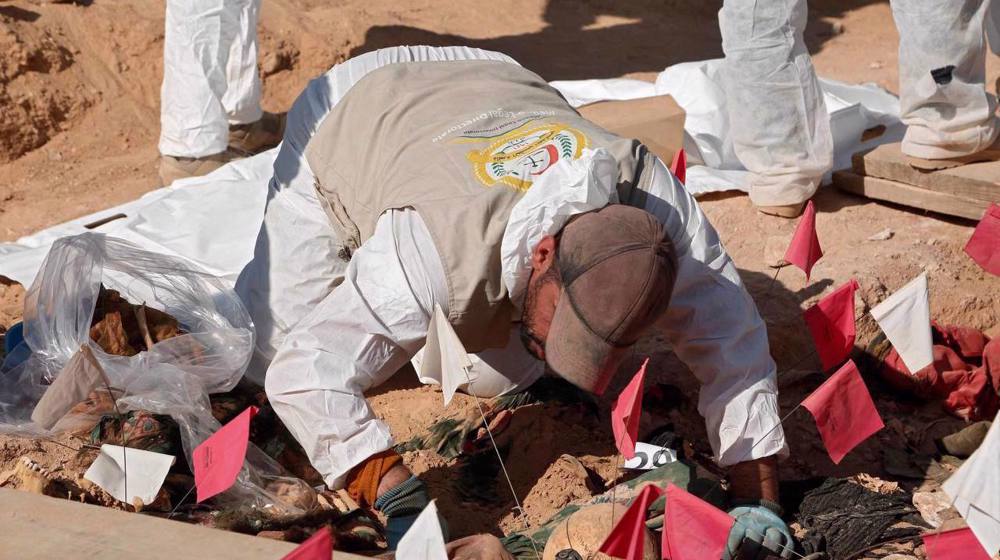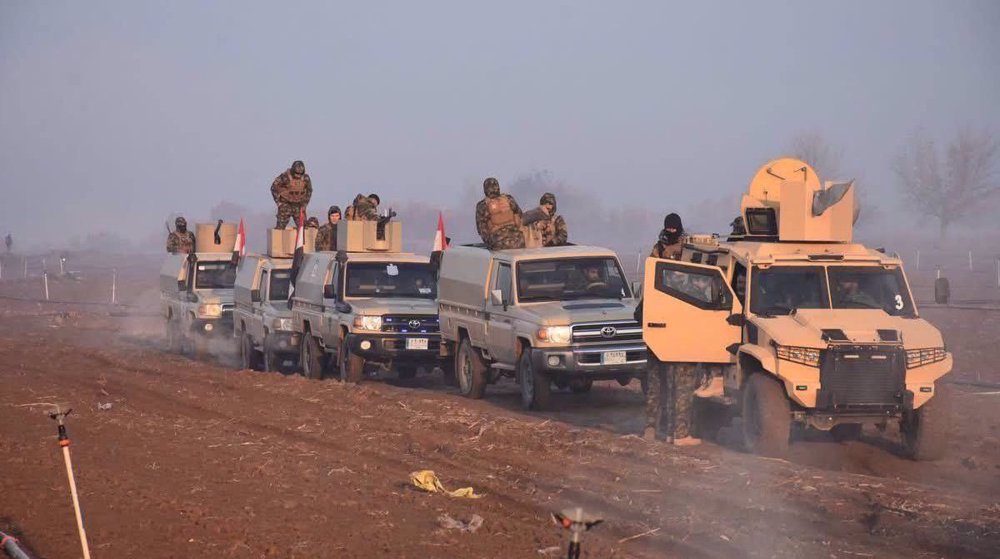Iraqis denounce rocket attack amid foul play suspicions
Iraq's Kata'ib Hezbollah, a major pro-government resistance group, says a rocket attack on Baghdad's Green Zone Sunday night is "unacceptable" and against the country's national interests.
No one has claimed responsibility for the attack which came in the wake of back-to-back sudden decisions taken by the US recently, including its withdrawal of "non-essential" staff from Iraq.
Those measures have surprised many Iraqi leaders and politicians who have questioned Washington's claims of stepped-up threats to American interests in the Arab country.
Jaafar al-Husseini, a spokesman for the pro-government militia Kata'ib Hezbollah, told reporters on Monday that the rocket attack was "unjustifiable" and contrary to Iraq's national interests.
The Green Zone, a 10-square-kilometer area in central Baghdad, is home to Iraqi government offices and those of other foreign governments, including the United States.
Although the apparent Katyusha attack hurt no one and its target was not specified, Trump was quick to point the finger at Iran in a tweet, saying if Tehran wants a war, "that will be the official end of Iran."
Trump's hawkish national security adviser, John Bolton, also headed to the White House to discuss the rocket attack, according to media reports.
Kata'ib Hezbollah's reaction came in the wake of the US having turned its attention to pro-government military groups which played a crucial role in defeating Daesh and other terrorist groups in Iraq.
Also Qais al-Khazali, the leader of another militia group known as Asaib Ahl al-Haq, reacted to the ongoing developments in a tweet, saying that a potential war is neither in the interest of the Islamic Republic of Iran nor of the United States of America.
He also warned against seeking pretexts to start a new war in the region, which would also endanger Iraq's political, economic and security situation.
“We caution against operations that are intended to provide pretexts for war,” said the tweet.
Meanwhile, prominent Shia cleric and politician Muqtada al-Sadr has warned that this war would mark the end of Iraq, adding, “We need peace and reconstruction.”
Any political party that would advocate such a war “would be the enemy of the Iraqi people,” Sadr commented.
Washington has commonly described the popular Iraqi forces as “Iran-backed proxies” despite being formally funded and incorporated into Iraq’s security forces.
Earlier this month, during an unannounced visit to Baghdad, US Secretary of State Mike Pompeo called on the Iraqi government to restrain popular mobilization and anti-terror forces, saying they posed a “threat” to US interests.
Western media reports said Washington had notified Iraqi officials that the US might even directly attack the groups without coordinating with Baghdad if it perceived any threat.
The US military also said its forces in Syria and Iraq were ordered to stay vigilant over fears of "imminent threats" from what it called Iran-backed forces in the region.
Speaking to reporters last Tuesday, Iraqi Prime Minister Adel Abdul-Mahdi made it clear that Iraq had not observed “movements that constitute a threat to any side.”
Over the past few days, the US has put its political staff in its Baghdad embassy as well as in the American consulate in the Iraqi city of Erbil on high alert without a viable reason.
American energy giant Exxon Mobil also pulled its foreign workers out of West Qurna 1 oil field in Iraq's southern province of Basra, a move Iraq's Oil Minister Thamir al-Ghadhban called "unacceptable and unjustified."
'US stirring tension in Iraq to score negotiation points'
Iraqi political analyst Wathiq al-Hashimi said Sunday that Washington was building up a tension about the security situation in Iraq in order to drive a wedge between the Arab country and Iran.
He said in an interview with China Central Television (CCTV) that the recent measures by the US in Iraq were meant to send Iran a clear warning following high-profile visits to Baghdad by Iranian President Hassan Rouhani and Foreign Minister Mohammad Javad Zarif.
"Presidents of the US and Iran and foreign ministers of the two countries previously visited Iraq in a row. Now the US sends a warning signal to Iran that it is going to do something," Hashimi said.
Trump caused outrage among Iraqi people and officials by suggesting during and after his Christmas trip to the country that he would use Iraq as a platform to "watch" Iran and take action against it if necessary.
The US has recently raised the stakes in its so-called maximum pressure campaign against Iran. Washington sent a carrier strike group as well as strategic B-52 bombers to the region in a "clear warning" to Tehran.
The deployment came days before several oil tankers were mysteriously "sabotaged" off the UAE emirate of Fujairah last week.
Read More:
- Iraqi PM: Our country won't be used to attack others
- President Salih: Trump did not ask Iraq permission to watch Iran
While dismissing US brinksmanship as a psychological warfare, Iranian officials have made it clear that such maneuvers will not coerce Tehran into negotiations with the United States.
Leader of the Islamic Revolution Ayatollah Seyyed Ali Khamenei said last week that Tehran would not negotiate with the United States on another nuclear deal and such talks would be "poison".
Missile fired from Yemen hits Tel Aviv
VIDEO | Iran emerging as aviation service hub through innovative solutions
Iraq exhuming remains of 100 Kurdish women, children killed by Saddam
Panama rejects talks with US over canal control
VIDEO | Israel Yemen aggression
HTS rulers name al-Qaeda operative as Syria's new spy chief
Iran voices concern about rising insecurity, violence in Syria
VIDEO | Karachi sit-in amplifies nationwide call for justice for Parachinar victims











 This makes it easy to access the Press TV website
This makes it easy to access the Press TV website